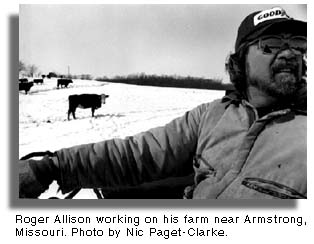| One factory farm operation puts out more raw, untreated sewage than a city five times as large as Kansas City, virtually unregulated. "You Don't Miss the Water 'till the Well Runs Dry" Roger Allison is the executive director of the Missouri Rural Crisis Center (MRCC). The following article was delivered by him as the keynote speech at the MRCC annual meeting on the 26th of July, 1997.  First off, I want you to know what we're up against in this state. A few months ago Missouri was eligible for $22 million in federal monies to fund improvements in drinking water systems. This gift came with very little strings attached -- it just required the passage of Safe Drinking Water Act Amendments which would involve stricter fines for those who violate drinking water standards. Most of the money was earmarked to go to rural water districts. But amazingly Missouri had to turn down this generous offer. Was it because of jealous urban legislators? No, opposition came from groups like the Missouri Pork Producers, the Cattlemen, the Farm Bureau, Mo-Ag and others. First off, I want you to know what we're up against in this state. A few months ago Missouri was eligible for $22 million in federal monies to fund improvements in drinking water systems. This gift came with very little strings attached -- it just required the passage of Safe Drinking Water Act Amendments which would involve stricter fines for those who violate drinking water standards. Most of the money was earmarked to go to rural water districts. But amazingly Missouri had to turn down this generous offer. Was it because of jealous urban legislators? No, opposition came from groups like the Missouri Pork Producers, the Cattlemen, the Farm Bureau, Mo-Ag and others.
These agri-business groups tried to get an amendment hooked on that would have restricted Missouri to "no stricter than federal'' federal rules on Clean Water--that is water in streams, rivers, lakes, and groundwater--NOT drinking water. This is the kind of shortsighted mindset that argues against any environmental protection if it affects big producers even one iota. Here and in other cases, these Big Ag put corporate interests above rural interests. Unfortunately these agribusiness-groups wield a lot of influence. Their agenda puts out the challenge to the rest of us that if we care about the kind of future we're leaving our children, we'd better join together. It has always been clear to the members and leaders of the MRCC that we as family farmers and rural citizens cannot win economic or social justice in isolation from the rest of society. Those of us without the huge capital to buy and sell power have been purposely separated from the only true source of power--each other. We have been separated by the color of our skin, by what gender we are, by whether we call ourselves farmers or environmentalists, if we live in a rural area or the inner city. The MRCC members have been at the forefront at breaking down those barriers and building a mutual understanding. Over the last 12 years, we have left our mark at the county, state and federal level by organizing and working together with our natural allies to sustain our communities and to build a better future for all of us. Chillicothe is significant in the history of our organization and is an example of what people working together can accomplish. On March of 1986, MRCC stood up with farmers from the area to protest a local government loan officer's abusive practices and to raise awareness of the deepening farm and rural crisis. For 145 days, farmers, rural people, urban people, organized labor, and the civil rights community rallied together and demanded fairness. The most progressive Federal Farm Credit legislation since the New Deal was passed in 1987 along with Chapter 12 reorganization for family farmers, and tens of thousands of farmers were able to stay on their farms as a result. In the past year we have had significant victories. A prime example of successfully building relationships with our natural allies and challenging the powers that be has been in our fight against the industrialization of the hog industry. Corporations, National Pork Producers Council, other commodity groups and land grant universities wanted us to believe this industrialization is inevitable, that factories are like famillies, that mass production makes better meats and profits, and that the hungry world should be thankful for high-tech methods that keep animals alive and growing in unspeakable conditions. If MRCC members had not led the fight, these myths would now be known as fact. The single most important issue in agriculture today is the industrialization of agriculture. We know the industrialization of hogs is where the battle has to be fought over the future of agricultue in our country. Do we want factory farms or family farms? The factory farm corporations and their lackeys say that factory farms are "State of the Art", more efficient than family farms, environmentally sound, produce a better quality meat product and bring us much needed economic development. At the state level, MRCC set up an agriculture policy task force, comprised of 14 community based organizations and the Sierra Club--many are here today. The community based organization members had been directly impacted negatively by the factory farms. Because of our collective efforts, Missourians no longer believe that factory farming is high-tech. They no longer believe that putting thousands of animals in one building with no fresh air, sunshine or room to move around, pumping them full of antibiotics and other chemicals, digging a big hole the size of several football fields and 25 foot deep and flushing it full of millions of gallons of feces, urine, and chemicals is "state of the art." Factory farm spills have polluted more Missouri streams and killed more fish in a three week period than caused by family farms raising more than twice as many hogs during the last decade. One factory farm operation puts out more raw, untreated sewage than a city five times as large as Kansas City, virtually unregulated. These factory farms and their corporate offshoot "The Contract Factory Farm" have got to be regulated and held accountable for being the polluting industry that they are. Their waste needs to be containerized above ground to stop the venting into the air of their excessive nitrogen, ammonia, hydrogen sulfide and methane. Factory farms are not about efficiency, they are not about quality product-- they are about huge investment of capital and their control of the market. Studies have shown that family farms are more efficient and produce more local business and jobs. Family farms have always met consumer demand. Premium Standard Farms loses hundreds of millions of dollars and has never shown profit in any year--yet they still boast of their efficiency. Patchwork Family Farms puts out meat products without the use of continual antibiotics or animal byproducts, and our animals are raised outside with access to fresh air, sunshine and an occasional mudhole. Our sausage has much less fat content than the industry leaders who have an average fat content of over 36%.
In Missouri, MRCC and task force members were successful in exposing the University of Missouri Commercial Agriculture Program for providing the Department of Natural Resources with the faulty data which allowed factory farms to pollute the environment with over-application of waste. We were also successful in redirecting extension plans to discredit past and future health ordinances in the state of Missouri. MRCC works on a number of fronts. We have eight food coop chapters that distribute to more than 700 rural farms and residents every month through the thousands of hours of volunteer time and a program that provides fresh produce, Patchwork Family Farms meats, and dry staples. The chapters have increased the participation program by more than 36% from last year at this time. Food coop leaders wrote letters and let their voices be heard in our support of the repeal of the regional food tax. Bill Christison and other members of MRCC have been in the forefront of the opposition to genetically altered seed beans and corn. Bill has toured with Greenpeace across Europe to let U.S. farmers' concerns be known; our fears of further consolidation; and the forcing out of independent Family Farms by Corporations' patenting of our seed stock and their decision on who farms and who doesn't. We must fight for a grain system that lets consumers choose through labeling if they want to get genetically altered products or not. On our panel you will hear all of our voices. Together we have made tremendous progress in positive impact on our communities, our state, and our country. The only way we can continue is to work together to get stronger, to organize ourselves and our communities and fight for justice for all. We at the MRCC have been inspired by the dedication and work of all of you and we look forward to the future challenges. |
| Published in In Motion Magazine August 7, 1997. |
If you have any thoughts on this or would like to contribute to an ongoing discussion in the  What is New? || Affirmative Action || Art Changes || Autonomy: Chiapas - California || Community Images || Education Rights || E-mail, Opinions and Discussion || En español || Essays from Ireland || Global Eyes || Healthcare || Human Rights/Civil Rights || Piri Thomas || Photo of the Week || QA: Interviews || Region || Rural America || Search || Donate || To be notified of new articles || Survey || In Motion Magazine's Store || In Motion Magazine Staff || In Unity Book of Photos || Links Around The World NPC Productions Copyright © 1995-2020 NPC Productions as a compilation. All Rights Reserved. |


 This year our publication
This year our publication